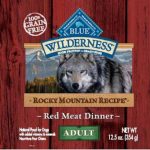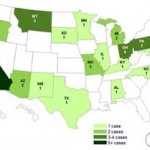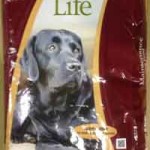Raw pet foods can be contaminated with pathogenic bacteria such as E. coil O157:H7, Salmonella, and Listeria monocytogenes, according to a new study published in the journal Veterinary Record. These findings show that raw meat-based diets (RMBDs) "may post a risk to both animal and human health," according to the study. The study was conducted at Utrecht University in the Netherlands. Raw pet foods have risen in popularity in the past few years. Humans are at risk for possible illness by handling the food, and by touching or petting animals fed this food. Pathogens can also be passed from pet fed raw diets to human by the dog or cat licking people. The researchers analyzed 35 commercial products from eight different brands. They found E. coli O157:H7 in 23% of the samples, … [Read more...]
Blue Buffalo Recalls Dog Food for Elevated Hormones
Blue Buffalo Company is recalling one lot of Blue Wilderness Rocky Mountain RecipeTM Red Meat Dinner Wet Food for Adult Dogs, since it may contain elevated levels of naturally-occurring beef thyroid hormones. Dogs ingesting too many of these compounds could exhibit symptoms such as increased thirst and urination, weight loss, increased heart rate, and restlessness. With prolonged consumption, symptoms may become more severe and may include vomiting, diarrhea, and rapid or difficulty breathing. If these symptoms occur, contact your veterinarian immediately. No reports of sick dogs have been reported to the company, but the FDA told Blue Buffalo about one customer who exhibited those symptoms in one dog, who has fully recovered. The recalled product is Blue Wilderness Rocky Mountain … [Read more...]
Study on Prevalence of Listeria, Salmonella and E. coli in Pet Food
The Veterinary Laboratory Investigation and Response Network (Vet-LIRN), with the Food Emergency Response Network (FERN) and its Microbiology Cooperative Agreement Program (MCAP) labs have conducted a study to look at the prevalence of selected bacteria in pet foods. The goal was to help the Center for Veterinary Medicine prioritize future testing, and increased FERN screening for foodborne pathogens in pet food that may be a significant health risk to consumers.Six FDA FERN MCAP labs analyzed more than 1,000 samples over 2 years. The labs tested for Salmonella, Listeria species, E. coli O157:H7, and Shiga toxin-producing strains of E. coli (STEC). Dry and semi moist dog and cat foods were purchased from local stores in Phase 1. Raw dog and cat foods, exotic animal feed, and jerky … [Read more...]
Salmonella Outbreaks from Contact with Tainted Pet Food
A Salmonella outbreak caused by contact with frozen rodents used as food for snakes and other pets has sickened 37 people in 18 states, the Centers for Disease Control and Prevention (CDC) announced this week. And this isn't the first time contact with tainted pet food has caused illness in humans. Since 2007, there have been four such Salmonella outbreaks, according to the CDC. People can get sick from contaminated pet food by feeding a pet or touching a surface the food has touched and then not thoroughly washing their hands before touching their face or eating a meal. The current Salmonella Typhimurium outbreak, which has hospitalized five people, has been linked to Arctic Mice brand frozen rodents produced by Reptile Industries, Inc. of Naples Fla. and sold at PetSmart stores … [Read more...]
Food & Water Watch Responds to FDA Pet Jerky Investigation
Food & Water Watch has responded to the latest information released by the FDA about their investigation into the pet deaths and illnesses linked to jerky treats imported from China. Wenonah Hauter, executive director of the agency said in a statement, "this ongoing health threat to American pets illustrates how trade policy is trumping regulations to protect our health. When is the Obama administration going to show some backbone and stop the importation of these deadly products until we have some concrete answers?" At least 4,800 pets have been sickened by these imported products. At least 1,000 dogs have died as a result of their illness. The FDA does n0t have any answers, despite a lengthy investigation. The jerky treats are made from chicken, duck, or sweet potato. Some … [Read more...]
Pro Pet Recalls Dog and Cat Food For Possible Salmonella Contamination
Pro-Pet of St. Marys, Ohio is recalling dog and cat foods for possible Salmonella contamination. No illnesses have been reported. For a complete list of the recalled products, click the link above. The brand names under the recall include, Hubbard Life Happy Hound, Hubbard Life Cat Stars, Joy Combo cat food, QC Plus adult dog food. They were distributed online and through retail stores in: Arizona, California, Colorado, Connecticut, Florida, Georgia, Iowa, Illinois, Indiana, Kentucky, Massachusetts, Michigan, Minnesota, Montana, North Carolina, North Dakota, Nebraska, New Jersey, New Mexico, New York, Ohio, Pennsylvania, South Dakota, Tennessee, Texas, Virginia, Washington, Wisconsin and West Virginia Pet food contaminated with Salmonella poses a risk to pets and their humans. There … [Read more...]
FDA’s Pet Safety Tips To Avoid Medication Errors
When pets are sick, the last thing they need is medication error that could make them worse. The U.S. Food and Drug Administration (FDA) has put together some tips to help consumers avoid medication errors with their pets. Start by making sure you understand why the medication has been ordered for your pet and what it's supposed to do. Ask about side effects, or possible interactions with other drugs your pet may be taking. It's a good idea to keep a list of drugs your pet takes – including over-the-counter drugs, supplements, and prescription drugs. Tell the vet about any allergies or adverse reactions your pet has had to medications. Check to make sure the dosing instructions are clear. Before you leave the vet's office make sure you know: how many times each day your pet needs the … [Read more...]
FDA Proposes New Food Safety Rule For Animal Food
Days after it announced that as many as 600 pets have died and thousands of others have been sickened from jerky treats imported form China, the U.S. Food and Drug Administration (FDA) has proposed a rule to improve the safety of food for animals. In keeping with thrust of the Food Safety Modernization Act, the proposal is aimed at preventing foodborne illness linked to animal food rather than responding to it. “Unlike safeguards already in place to protect human foods, there are currently no regulations governing the safe production of most animal foods. There is no type of hazard analysis. This rule would change all that,” said Daniel McChesney, Ph.D., director of the Office of Surveillance and Compliance at FDA’s Center for Veterinary Medicine in a statement. For the first time, … [Read more...]
Food & Water Watch Responds to Jerky Treat Pet Illness Report
is responding to the FDA announcement that they are asking for the public's help in the mysterious illnesses apparently caused by pet jerky treats. This week, the government posted an update on the investigation admitting they don't understand what is going wrong, and giving veterinarians information about reporting cases. Wenonah Hauter, Executive Director of Food & Water Watch, said in a statement, "we appreciate the new information the agency posted. But America's pets are still at risk from these potentially deadly treats. Today's update from the FDA showed a drop in reported illnesses since the decision by Nestle Purina and DelMonte in January to recall their chicken jerky dog treats produced in China. But the source of the problem has still not been identified. And there are … [Read more...]












